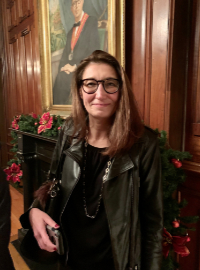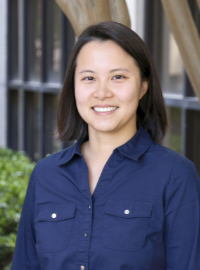Session three: Innovative Approaches to Generate Model Parameters
- 12:05 PM — 12:10 PM: Welcoming Remarks (Day Two) with Rafael Meza, PhD and David Levy, PhD
- ❏ Watch this presentation
- 12:10 PM — 12:35 PM: “Generating Model Parameters Analyzing Real-World Data Versus Conducting Discrete Choice Experiments: Impact of Vaping and Smoking Policies” with Jody Sindelar, PhD
- ❏ Watch this presentation❏ Slides from this presentation
- About this presenter and presentation +
 Jody Sindelar, PhD
Jody Sindelar, PhD- “Generating Model Parameters Analyzing Real-World Data Versus Conducting Discrete Choice Experiments: Impact of Vaping and Smoking Policies”
- This presentation will compare two methods of generating tobacco model parameters: 1) using quasi experimental methods with real world data versus 2) conducting discrete choice experiments (DCEs). Examples will be taken from a series of my coauthored studies estimating policy impacts using DCEs alongside a survey using a national sample online. Examples of quasi experimental studies will be drawn from a coauthored study and from a large, ongoing UMich/Yale data collection effort and analyses. The latter examines the impact of state policies. These studies all aim to estimate the impacts of tobacco policies on vaping and smoking. Bans on flavors in cigarettes and e-cigarettes as well as other policies are examined.
- Jody Sindelar, PhD
- Yale University: Professor of Public Health (Health Policy), Professor of Economics, and Professor in the Institution for Social and Policy Studies; Research Associate, NBER
- Professor Jody Sindelar is a professor of public health, health economist, and public policy expert in the Department of Health Policy and Management at Yale School of Public Health (YSPH), as well as with Yale’s Department of Economics. In addition, she is a research associate at the National Bureau of Economic Research (NBER), research fellow at the IZA Institute of Labor Economics, and faculty fellow at Yale’s Institution for Social and Policy Studies (ISPS). She is also a founding member and past president of the American Society of Health Economists (ASHEcon).Professor Sindelar’s expertise is on the economics of substance abuse, including addictive substances of tobacco/vaping, alcohol, and illicit drugs. She has published on the impacts of substance abuse on productivity, educational attainment, gender differences, and other policy issues; and in various journals of economics, policy, addiction, health and medicine. Also, she has served on numerous editorial, review, and advisory boards and committees, and has presented her research at seminars and conferences both nationally and abroad. Professor Sindelar has given keynote addressesto conferences in the United States, Australia, Germany, Italy, and Sweden. She has also been a visiting professor at several universities and institutes, including Boston University in Boston, MA; the Rand Corporation in Santa Monica, CA and Washington, DC; Centro de Investigación y Docencia Económicas (CIDE) in Mexico City, Mexico; and Shanghai Jiao Tong University Medical School in Shanghai, China. In addition, she has had sabbaticals at the Institut d'études Politiques de Paris (Paris Institute of Political Studies) in Paris, France; Stanford University in Stanford, CA; and the University of Pennsylvania.Professor Sindelar has been a principal investigator or collaborator on numerous research projects funded by various organizations, including the Agency for Healthcare Research and Quality (AHRQ); Centers for Medicare and Medicaid Services (CMS); Connecticut Department of Social Services (DSS); Food and Drug Administration (FDA); National Institute of Alcohol Abuse and Alcoholism (NIAAA); National Institute of Mental Health (NIMH); National Institute on Aging (NIA); National Institute on Drug Abuse (NIDA); Robert Wood Johnson Foundation (RWJF); Department of Veterans Affairs (VA); Yale Center for Clinical Investigation (YCCI); and the Federal Drug Administration.
- 12:35 PM — 1:00 PM: “Expert Elicitation – Insights and Lessons Learned” with Aylin Sertkaya, PhD
- ❏ Watch this presentation❏ Slides from this presentation
- About this presenter and presentation +
 Aylin Sertkaya, PhD
Aylin Sertkaya, PhD- “Expert Elicitation – Insights and Lessons Learned”
- Decision makers and analysts must frequently rely on data or information that is incomplete or inadequate in one way or another. Expert judgment then plays a critical role in the interpretation and characterization of those data as well as in the completion of information gaps. But how experts are selected, and their judgments elicited matters – they can also strongly influence the opinions obtained and the analysis on which they rely. This talk will cover expert elicitation basics as well as its limitations, problems, and risks. The talk will also broadly address the use of expert elicitation in model framework and parameter development.
- Aylin Sertkaya, PhD
- Eastern Research Group, Inc.: Senior Economist and Vice President
- Dr. Aylin Sertkaya, an ERG senior economist and vice president, designs and conducts economic analyses in support of a wide variety of public policy initiatives. Her work includes examining the costs and benefits of federal programs, particularly those that affect public health and safety, and requires close collaboration with scientists, policymakers, independent experts, and other stakeholders. She has been the director of ERG’s economics team for over 10 years. Aylin received a Recognition Award from the Food and Drug Administration for her work on effective quality systems and risk management approaches as part of FDA’s cGMPs (current Good Manufacturing Practices) in the 21st Century initiative. She has held several leadership positions in the Society for Risk Analysis, including president of SRA’s New England chapter, chair of its Economics and Benefit Analysis Specialty Group, and chair of numerous sessions at SRA meetings. She received the SRA Recognition Award for the workshop on expert elicitation methods that she has co-organized for SRA annual meetings since 2008. Aylin holds a Ph.D. in economics and a B.A. in physics and economics, with a minor in mathematics.
- 1:00 PM — 1:10 PM: Break
- 1:10 PM — 1:35 PM: “An Experimental Model of the Tobacco Marketplace” with Warren Bickel, PhD
- ❏ Watch this presentation❏ Slides from this presentation
- About this presenter and presentation +
 Warren Bickel, PhD
Warren Bickel, PhD- “An Experimental Model of the Tobacco Marketplace”
- The tobacco marketplace is experiencing rapid changes in the type and number of tobacco products and new policies. Adding to that complexity is the illegal tobacco marketplace, which will continue to develop in response to some policies. Here we report on the Experimental Tobacco Marketplace (ETM) paradigm that we have developed and tested in various studies. The ETM is a methodology developed to forecast the consequences of regulatory policies on consumer behaviors before policy implementation. The ETM is a virtual purchasing experience that places a mix of products differing in prices, flavors and nicotine concentration, and specific regulations under experimental control to simulate “real-world” changes in the dynamic tobacco marketplace. This methodology provides estimates of the effects of regulatory changes on tobacco purchasing patterns, including between-product substitution and illegal purchases by different types of tobacco product consumers when faced with price-focused (e.g., taxes or subsidies) or product-focused (e.g., product restrictions) policies. The strength of the ETM includes versatility to model the legal and the illegal tobacco marketplace and the capacity to rapidly explore factors that may change consumers’ behaviors. Here we will review our studies that describe the substitution patterns resulting from increases in cigarette price and/or policy changes including nicotine vaping products (NVP) nicotine concentration, cigarette taxes and NVP subsidies, workplace restrictions, restrictions on filter ventilation, and illegal purchasing resulting from a reduces nicotine standards for cigarettes and NVP bans. Collectively, this presentation will provide the contemporary status of this methodology and its utility in tobacco regulatory science.
- Warren Bickel, PhD
- Virginia Tech: Carilion Inaugural Professor of Behavioral Health Research; Director, Addiction Recovery Research Center; Director, Center for Transformative Research on Health Behaviors, Fralin Biomedical Research Institute at VTC
- Dr. Bickel is an accomplished scholar and researcher in addiction and health behavior research. He received his Ph.D. in developmental and child psychology from the University of Kansas and completed post-doctoral training at Johns Hopkins University School of Medicine. He has led research programs at the Albert Einstein College of Medicine, the University of Vermont, and the University of Arkansas for Medical Sciences. Dr. Bickel currently leads NIH-funded research programs at the Fralin Biomedical Research Institute at VTC. He is the recipient of numerous awards and honors including the 2016 Nathan B. Eddy Award for Outstanding Research. Dr. Bickel has co-edited five books and published over 470 papers and chapters. His work is frequently cited and receives national and international recognition.
- 1:35 PM — 2:00 PM: “Generating Models Before Generating Parameters: A Bayesian Network Approach” with Raymond Niaura, PhD
- ❏ Watch this presentation❏ Slides from this presentation
- About this presenter and presentation +
 Raymond Niaura, PhD
Raymond Niaura, PhD- “Generating Models Before Generating Parameters: A Bayesian Network Approach”
- Computational and statistical models are useful tools for purposes of explanation and prediction. Construction of models is usually based on expert judgement and/or consensus, or is set by default by the analytic approach that is chosen. All models encounter difficulties as the number of variables increases. Here I present a Bayesian network, data-driven approach to model structure learning which relies on several machine learning algorithms to construct and search for plausible model structures within a dataset. These can be compared to one another and to pre-existing models. I will use an example from the PATH Study youth sample to illustrate this approach.
- Raymond Niaura, PhD
- New York University: Interim Chair of the Department of Epidemiology; Professor of Social and Behavioral Sciences
- Dr. Raymond Niaura is a psychologist and an expert on tobacco dependence and treatment, as well as substance use and addiction to alcohol. Dr. Niaura researches the biobehavioral substrates of tobacco dependence, including factors that influence adolescent and early adult tobacco use trajectories. He also evaluates behavioral and pharmacological treatments for tobacco cessation, with a particular interest in cessation in disadvantaged population to address public health disparities in tobacco-related burdens of illness and disability. For eight year, Dr. Niaura was the Director of Science and Training at the Schroeder Institute (SI) for Tobacco Research and Policy Studies at the Truth Initiative, where he also supervised the pre- and post-doctoral training programs. Dr. Niaura has previously taught and conducted research at Brown University, Johns Hopkins Bloomberg School of Public Health, the Georgetown Medical Center, and the School of Public Health at University of Maryland. He was also a former President of the Society for Research on Nicotine and Tobacco and is a Deputy Editor of the Nicotine and Tobacco Research. With grants from the National Institutes of Health, numerous foundations, and private industry, Dr. Niaura has published over 400 peer-reviewed articles, commentaries, and book chapters, including the book The Tobacco Dependence Treatment Handbook: A Guide to Best Practices.
- 2:00 PM — 2:45 PM: Panel Discussion with Jody Sindelar, PhD, Aylin Sertkaya, PhD, Warren Bickel, PhD and Raymond Niaura, PhD
- ❏ Watch this presentation
- 2:45 PM — 2:55 PM: Break
Session four: The Next Generation of Tobacco Modelers
- 2:55 PM — 3:15 PM: “Social Network Structure and Cigarette Smoking Among Adolescents and Young Adults” with Iris Shao, MPH
- ❏ Watch this presentation❏ Slides from this presentation
- About this presenter and presentation +
 Iris Shao, MPH
Iris Shao, MPH- Iris Shao, MPH
- Emory University: Doctoral Student
- Iris Yuefan Shao is currently a doctoral candidate at Emory University Rollins School of Public Health Department of Epidemiology. Her main research focuses on evaluating the role of social network structure in shaping population-level tobacco use behavioral patterns and targeting intervention effectiveness. Methodologically, she is interested in applying a systems modeling approach to evaluate the effectiveness of tobacco control programs for health disparity reduction.
- 3:15 PM — 3:35 PM: “An Estimation of the Harm of Menthol Cigarettes in the United States from 1980-2018” with Thuy Le, PhD
- ❏ Watch this presentation
- About this presenter and presentation +
 Thuy Le, PhD
Thuy Le, PhD- “An Estimation of the Harm of Menthol Cigarettes in the United States from 1980-2018”
- In this talk, I’ll present how we used a mathematical model with publicly available data to quantify the damage attributed to menthol cigarettes in the United States from 1980 through 2018. The numbers of extra new smokers, smoking-related premature deaths and life years lost (due to menthol cigarette smoking) are considered as the measures of the harmful effects of menthol.
- Thuy Le, PhD
- University of Michigan: Postdoctoral Fellow
- Dr. Thuy Le received her diploma degree in Applied Mathematics from Belarusian State University, Belarus, in 2012 and her Ph.D. degree in Applied Mathematics from the University of Padua, Italy, in 2016. She is currently a postdoc at the University of Michigan School of Public Health. Her current research interests include control theory, optimization and mathematical modeling.
- 3:35 PM — 3:55 PM: “Trends in Nicotine Product Use among U.S. Adolescents, 1999-2020” with Ruoyan Sun, PhD
- ❏ Watch this presentation❏ Slides from this presentation
- About this presenter and presentation +
 Ruoyan Sun, PhD
Ruoyan Sun, PhD- “Trends in Nicotine Product Use among U.S. Adolescents, 1999-2020”
- With rising e-cigarette use among U.S. adolescents and declining use of other tobacco products, it is unclear how total use of nicotine products, and its long-term health risks, have changed. CDC’s standard measure – any tobacco product use in the past 30 days – considers neither frequency of use nor product risk implications. In this study, we investigate how nicotine product use, including frequency of use, and its associated risks have changed among middle and high school students since 1999, using cross-sectional data from the National Youth Tobacco Survey, 1999-2020. We propose a new measure, use of nicotine products assessed by nicotine product days (NPD), the number of days that the average student consumed these products in the past 30 days. Risk-adjusted NPD accounts for differential long-term health risks of various products. Using nationally representative cross-sectional data for high school students, NPD decreased steadily from 5.57 days/month in 1999 (95% CI, 4.95-6.19) to 2.24 in 2017 (95% CI, 1.85-2.63), increased to 4.58 in 2019 (95% CI, 4.07-5.08), and dropped to 3.56 in 2020 (95% CI, 2.98-4.13). For a risk weight of 0.1 for e-cigarettes, compared with combustible products, risk-adjusted NPD dropped from 2.53 days/month in 2013 (prior to the popularity of e-cigarettes) to 2.03 in 2019 and 1.38 in 2020. However, with a risk weight of 1.0 for e-cigarettes, risk-adjusted NPD increased to 5.30 days/month and 3.92 days/month, respectively. Similar trends were found for middle school students. NPD represents an improvement, albeit an imperfect one, over any 30-day tobacco product use by adding in the frequency of use of various products. By distinguishing products, NPD permits consideration of the health consequences associated with different mixes of products over time. Health risks of adolescent nicotine product use could have decreased during vaping’s popularity if one’s assessment of the long-term risks associated with vaping compared to those of smoking is low. We need to closely monitor youth nicotine and tobacco product use patterns.
- Ruoyan Sun, PhD
- University of Alabama: Assistant Professor, Department of Health Care Organization and Policy, School of Public Health
- Ruoyan Sun is an Assistant Professor in the Department of Health Care Organization and Policy at UAB School ofPublic Health. Trained in health economics and operations research, she applies a variety of quantitative methods to evaluate tobacco control policies. Her research focus on three main topics. First one is policy simulation, specifically modeling and simulating changes in smoking behaviors (initiation and cessation) via agent based modeling. The second one utilizes optimal control methods with mathematical models to assess optimal mix of interventions to reach tobacco control goals. Using survey data, she also examines risk factors for adolescent vaping in the US. Recently, Dr. Sun started a new line of research, mining social media data on e-cigarettes for content and sentiment analysis.Dr. Sun received her undergraduate degree from College of William and Mary, a master’s degree from Johns Hopkins University and her Ph.D. from the University of Michigan.
- 3:55 PM — 4:00 PM: Closing Remarks with Rafael Meza, PhD and David Levy, PhD